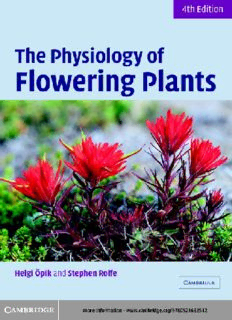
The Physiology of Flowering Plants PDF
Preview The Physiology of Flowering Plants
This page intentionally left blank The Physiology of Flowering Plants Fourth Edition This latest edition of The Physiology of Flowering Plants has been completely updatedtocovertheexplosionofinterestinplantbiology.Awhole-plant approachhasbeenusedtoproduceanintegratedviewofplantfunction, coveringboththefundamentalsofwholeplantphysiologyandthelatest developmentsinmolecularbiology.Newdevelopmentsinmoleculartech- niques are explained within practical applications such as genetically modifiedplants.Thebookfurtherexamines: * photosynthesis,respiration,plantgrowthanddevelopment; * nutrition,waterrelations,photomorphogenesisandstressphysiology; * function,withparticularattentiontoadaptationstodifferenthabitats. Eachchapterisfullyreferencedwithsuggestionsforcomplementaryread- ingincludingreferencestooriginalresearchpapers. ThePhysiologyofFloweringPlantsisvaluabletobothundergraduateand postgraduatestudentsstudyingplantbiology. HELGIO¨PIK wasSenior Lecturer in theSchoolof Biological Sciences atthe UniversityofWales,Swanseauntilherretirement.Throughouthercareer she has taught plant physiology at all undergraduate levels, and since retiringhaslecturedinplantphysiologyforadulteducation.Herresearch interests haveincluded plantrespiration andultrastructure,alwaysaim- ingatintegrationofstructureandphysiologicalfunction. STEPHENROLFEwasawardedaEuropeanMolecularBiologyFellowship and undertookpostdoctoralresearchonthephytochromeregulationofgene expressionattheUniversityofCalifornia,LosAngeles.Hetookupapostat the Department of Animal and Plant Sciences, University of Sheffield in 1991. His research interests include the study of photosynthesis and pri- mary plant metabolism, with a special interest in non-invasive imaging techniques. The Physiology of Flowering Plants Fourth Edition ¨ Helgi Opik FormerlySeniorLecturer, SchoolofBiologicalSciences, UniversityofWales, Swansea Stephen A. Rolfe SeniorLecturer, DepartmentofAnimalandPlantSciences, UniversityofSheffield AcademicConsultantEditor Arthur J. Willis EmeritusProfessor, UniversityofSheffield Cambridge, New York, Melbourne, Madrid, Cape Town, Singapore, São Paulo Cambridge University Press The Edinburgh Building, Cambridge , UK Published in the United States of America by Cambridge University Press, New York www.cambridge.org Information on this title: www.cambridge.org/9780521662512 © H . Ö p i k & S . R o l f e 2 0 0 5 This book is in copyright. Subject to statutory exception and to the provision of relevant collective licensing agreements, no reproduction of any part may take place without the written permission of Cambridge University Press. First published in print format 2005 - ---- eBook (NetLibrary) - --- eBook (NetLibrary) - ---- hardback - --- hardback - ---- paperback - --- paperback Cambridge University Press has no responsibility for the persistence or accuracy of s for external or third-party internet websites referred to in this book, and does not guarantee that any content on such websites is, or will remain, accurate or appropriate. Contents Preface page ix Chapter1 Introduction 1 1.1Appreciatingplants 1 1.2Whatkindofplantphysiology? 2 1.3Molecularbiologyandplantphysiology:theintegration ofdisciplines 3 1.4Outlineofthetext 5 PartI Nutritionandtransport Chapter2 Flow ofenergyandcarbonthroughtheplant: photosynthesisandrespiration 9 2.1Introduction 9 2.2Energyflowandcarbonturnoverinthebiosphere 9 2.3Photosynthesis:lightabsorptionandutilization 12 2.4Thefixationofcarbondioxide 18 2.5Limitingfactorsforphotosynthesis 30 2.6Theefficiencyofenergyconversioninphotosynthesis 32 2.7Photosynthesisandtheincreaseinatmospheric carbondioxide 36 2.8Respiration:theoxidativebreakdownoforganiccompounds 38 2.9Terminaloxidationandoxidativephosphorylation 46 2.10Anaerobicrespiration 49 2.11Respirationandplantactivity 53 Chapter3 Waterrelations 60 3.1Introduction 60 3.2Watermovementandenergy:theconceptof waterpotential 61 3.3Waterpotentialsofplantcellsandtissues 61 3.4Waterrelationsofwholeplantsandorgans 68 3.5Thetransportofsolutesinthexylem 85 3.6Wateruptakeandloss:controlbyenvironmentaland plantfactors 86 3.7Waterconservation:xerophytesandxeromorphiccharacters 95 Chapter4 Mineralnutrition 100 4.1Introduction 100 4.2Essentialelements 100 VI CONTENTS 4.3Ionuptakeandtransportintheplant 106 4.4Nitrogenassimilation,fixationandcycling 122 4.5Problemswithmineralelements:deficiency andtoxicity 128 Chapter5 Translocationof organiccompounds 133 5.1Introduction 133 5.2Phloemasthechannelfororganictranslocation 133 5.3Therateanddirectionoftranslocation 139 5.4Phloemloadingandunloading 142 5.5Partitioningoftranslocatebetweensinks:integration atthewhole-plantlevel 146 5.6Themechanismofphloemtranslocation 148 PartII Growthanddevelopment Chapter6 Growthasaquantitativeprocess 161 6.1Introduction 161 6.2Themeasurementofplantgrowth 162 6.3Growth,developmentanddifferentiation 163 6.4Localizationofgrowthinspaceandtime 164 6.5Conditionsnecessaryforgrowth 165 6.6Growthrates 167 Chapter7 Plantgrowthhormones 177 7.1Introduction 177 7.2Plantgrowthhormones 178 7.3Detectionandquantificationofhormonesinplants 191 7.4Howdoplanthormonescauseresponses? 194 Chapter8 Cellgrowthanddifferentiation 205 8.1Introduction 205 8.2Meristemsandcelldivision 205 8.3Mitochondrialandplastiddivision 211 8.4Cellexpansion:mechanismandcontrol 213 8.5Celldifferentiation 218 Chapter9 Vegetativedevelopment 221 9.1Introduction 221 9.2Thestructureandactivityoftheshootapicalmeristem 221 9.3Organformation 225 9.4Secondarygrowth 227 9.5Developmentoftheleaf 228 9.6Thestructureandactivityoftherootapicalmeristem 239 CONTENTS VII Chapter10 Photomorphogenesis 246 10.1Introduction 246 10.2Theswitchfrometiolatedtode-etiolatedgrowth 247 10.3Phytochromeandphotomorphogenesis 248 10.4UV-A/bluelightphotoreceptors(cryptochrome) 255 10.5Genescontrollingetiolatedgrowth 256 10.6Unravellingphotomorphogenesis 257 10.7Phytochromesignaltransduction 263 Chapter11 Reproductivedevelopment 270 11.1Introduction 270 11.2Juvenilityand‘ripenesstoflower’ 270 11.3Thecontroloffloweringbydaylengthand temperature 271 11.4Plantsizeandflowering 277 11.5Theregulationoffloralinductionisa multifactorialprocess 279 11.6Floraldevelopment 281 11.7Patterndevelopmentinflowers 287 11.8Theformationofpollen 291 11.9Theformationoftheembryosac 293 11.10Pollination 295 11.11Embryoformation 301 11.12Seedsandnutrition 303 11.13Fruitdevelopment 308 11.14Seeddormancy 310 11.15Germinationandtheresumptionofgrowth 315 Chapter12 Growthmovements 318 12.1Introduction 318 12.2Nasticresponses 318 12.3Tropisms 320 Chapter13 Resistancetostress 344 13.1Introduction 344 13.2Terminologyandconcepts 344 13.3Water-deficitstress 346 13.4Low-temperaturestress 354 13.5High-temperaturestress 362 13.6Relationshipsbetweendifferenttypesofstress resistance:cross-tolerance 366 13.7Developmentofstress-resistantcropplants 368 VIII CONTENTS Appendix 373 A.1Naminggenes,proteinsandmutations 373 A.2Unitsofmeasurement 373 A.3Prefixesforunits 375 Index 376
